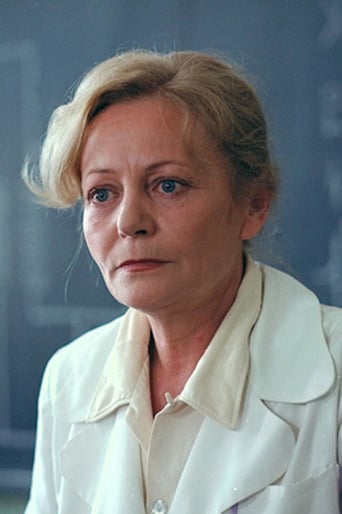Stevecorp
Don't listen to the negative reviews
Rosie Searle
It's the kind of movie you'll want to see a second time with someone who hasn't seen it yet, to remember what it was like to watch it for the first time.
Matho
The biggest problem with this movie is it’s a little better than you think it might be, which somehow makes it worse. As in, it takes itself a bit too seriously, which makes most of the movie feel kind of dull.
Candida
It is neither dumb nor smart enough to be fun, and spends way too much time with its boring human characters.
chaos-rampant
Okay, so my ongoing project is that I'm seeking out films where as you watch the self who sees comes into focus. The most clear and direct way is with slow filmmakers like Tarr and others, though it's a lost game if you let them simply numb you. Others like Greenaway, Lynch and Ruiz will do it by tricking you into invented realities, another boat down the same river. Usually there's some impatience, a trying to figure things out, a disorientation is central among these filmmakers as the first step. As you quiet down that impatient self, and films of this sort help, things become clearer, unusual insights appear. But it also helps to see past the filmmaker, most of the time he imposes on his created world by trying to explain (usually through a surrogate self) some part of it, reducing. Also clear, in this case it's the protagonist philosophizing on meaningless life, impossible salvation and the ruin of having to be, dreary stuff. Because he is the protagonist, we think some of it will shed some light. But that's just who Tarr is, gloomy, wondering. I don't doubt his sincere despair. But what's the use? Rest there and he'll suffocate you, stain you without cleansing. Anyway, discard all that, and it can be a different experience. It's a worthy film beneath the mud. It's a simple story, a schmuck is contracted to smuggle in a parcel, we can assume by the secrecy that it's some shady deal. In turn he contracts the husband of a woman he's having an affair with—a sexy torch singer. As the husband goes away, we go on to visit disconnected stops in this affair, this is what gives the film its dreamlike air. So that's the story. More interesting is the world behind it. Your clue is a recurring visual motif introduced with just the first shot—a hazy view of something, and pan to reveal someone watching, an intermediate self between you and things. He IS constantly obscuring the view by thinking what it's about. The second time it's like in a film noir, it's raining, a man is watching a bar. Inside the bar, we are seduced by the femme fatale's smoky song, maybe it's all a nightmare as the lyrics say. It's a wonderful scene that sets everything else up. So as per noir rules, desire fools with the schmuck's sense of reality and we have the rest of the film as hazy perturbation. He has done something wrong and knows it, sending the husband away. The third time the watcher motif appears, the woman is not looking out to life through the blinds, but inside the room, her gaze cramped by walls of his desire —the scene plays out with sex, mirrored in a mirror reinforcing inversed reality. So the affair grows stale—and lo, we have his endless monologues rationalizing frustration by directing it to the world, the world as punishment. And that as profundity that distracts. So who is obscuring the view? It's that intermediate self who instead of seeing, fidgets for more story and answers that preferably make some sense. It's your own self, fidgeting for more story when you watch a film like this. Isn't this something that actually happens? As you watch these ultra slow films, which is why they can help, doesn't your own fidgety self distract you by aimless thinking? Isn't that self getting in the way of what is potentially there for you? Imagine if Tarr acknowledged the fact in his narration, for instance like Nabokov does with self-deprecating layered humor—it'd be an astounding film.Tarr has set up other cool things, the husband knowing something is wrong as our guy's guilt, an older woman (his woman) suggesting peace in the dance together. But there are moments like when she quotes the Bible and the inane end with the dog, which muddle what it is about. Tarr was probably unsure himself, the interested part of him doing the noir abstraction, another part of him venting. But the scene at the bar, her song as noir hallucination. The architecture and roaming camera as in Marienbad. And all of it submerged as different levels of watching. I'd like to think Lynch saw this, and immediately knew which parts worked. Tarr is probably still unsure.
Tim Kidner
A bleak sense of the unreal hangs heavy over every scene of this atmospherically oppressive black and white 'apocalyptic film-noir', from Hungarian director, Bela Tarr.With a bar full of chatter-less men, accompanied by the odd clack from a pool table ball, a lone accordion laments. I so pictured Greta Garbo, or Marlene Dietrich half drawling, half wailing into the microphone, in another scene at the seedy Titanik Club. Known in the credits only as 'the singer', our subject is the forlorn Vali Kerekes, usually looking straggled by the rain, or just life itself, as she aimlessly - and toxically, a predatory abuser of all the men she has contact with, floats in and out of her life.True, Tarr's unrelenting melancholic, drifting camera, wafting like the blankets of fog, black and white images that evoke an earnest socio documented photo assignment from times past, won't ever be considered essential viewing at The Samaritans. However, there is a certain dreary prose to it all, that perhaps, this is what love and life is really like - and about.Sliding into an image, cinematographer Gabor Medivgy, meticulously composes every frame, even the most mundane. Sound is a key part to Tarr's work; a scene will almost be static, seemingly for many minutes (but actually seconds), such as the lovers embraced, naked, to the monotonous mechanical sound of the rail depot, the camera then swings so slowly round the room, to an image in the mirror of the couple now silently making love, then sweeping at the same speed to an old piano. This is simply masterful - a masterclass for all those interested in the art of film-making.I could go on, but will say that Damnation shouldn't be anyone's introduction to World, or indeed, Hungarian cinema. It could irreparably taint your outlook for a very long time! But for those seasoned in all forms of cinema and when viewed in suitable conditions (not a sunny day, but at night or on a rainy day; perfect) it is both compelling and oddly poetically beautiful.Compared to Bela Tarr's more well-known - and accessible 'Werckmeister Harmonies', this is more down to earth, the fantastical element has been replaced by an ugly dreary reality. So, please don't assume that because you enjoyed '...Harmonies', you necessarily will like Damnation too.
tieman64
"It's not social, it's not ontologial, it's cosmical, the s**t is cosmical!" - TarrThe world is hell and we're all damned, mourns Bela Tarr in "Damnation", a supremely bleak film. Bouncing from irredeemable gloom to relentless despair and finally defeat, the film paints a landscape of decaying homes, perpetual thunderstorms and dog infested streets. It's characters, meanwhile, spend all their time drinking booze and dancing listlessly at local nightclubs. They seek escape and solace, but both are temporary at best, illusions at worst. There's no running from the black.The film's key motif is a series of cable cars which run above the town, forever extracting coal from Tarr's dying mining community. Underneath this conveyor belt, this ribbon of constant motion, humanity remains immobilised, its life force slowly sucked away. While the world revolves, humanity remains in inky stasis, Tarr's characters both tethered painfully to the past and crippled by an unknowable future; tormented by memories and regrets, but scared of hoping. Nothing survives, Tarr says, you're dying the moment you're born. Why hope?Within this sickeningly bleak world lives a man called Karrer, a balding figure who navigates earth with a death mask. He wishes all children would die, if only to end the suffering that is the human race. The only joy he finds is in the presence of a woman, a local night club singer, but we sense that his love for her is itself selfish. She seeks to escape this hell, skipping town to become a famous singer elsewhere, but he can't have that. If she escapes then it places the blame of immobility on him. Better to keep her here, anchored, in the darkness, suffocated. Karrer's hope, then, is to reaffirm hopelessness. Indeed, nothing scares him more than children, with their bright eyes and cute faces, "because they swindle mankind into going on with this charade and condemn us all to an eternity of horror." For Karrer, who like everyone in the film speaks with apocalyptic aphorisms, existence itself should be rejected.The film ends with Karrer selling his soul to the authorities, before stepping back out into the rain. He picks a fight with a dog – he is one of them now – before disappearing behind a mound of dung. He's trapped, dead, his body already festering...whilst high above the village the cable cars continue their slow crawl, further and further into the air, always moving, a ticker tape to nowhere.8.5/10 – "Damnation" contains 3 excellent, powerful scenes, but its glacial pace will irk most viewers (increase the frame-rate on your DVD player). Kicked out of his university philosophy class for being too "extreme", Tarr quickly blossomed into the most suicide inducing film-maker since Antonioni. Though few have seen his films, he's been a huge influence on late career Gus Van Sant and Steven Soderbergh. His arty black and white cinematography lures us into a world of extremely long takes and extremely slow pans, the viewer beaten into submission by an aesthetic of inaction. Makes a good companion piece to "Red Desert ". Worth two viewings.
Corey Dalton
This is a beautiful film, and perhaps it is my own fault, but I got nothing from this. Yes, I can appreciate the excellent use of sound. Yes, I can appreciate the amazing camera work. But what's there? Is it supposed to be a portrait of "real life"? Of course not, no one speaks like that. The bar scene seemed like some kind of spoof on awful torch songs, which would make it even more embarrassing if it were meant to be taken in earnest. The plot (if you can call it that) is buried under so many layers of long shots (this is something best left to Tarkovsky) and awkward dialogue that one ceases to care what is happening at all. For all the film's merits, by the end I couldn't help but feel like I had wasted two hours. "There's no *there* there."





